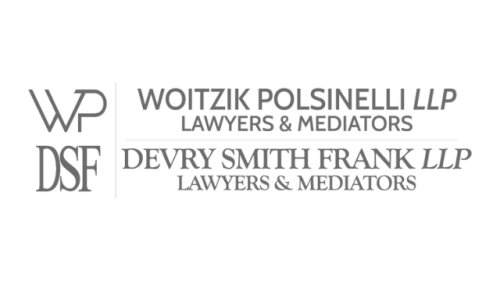Best Communications & Media Law Lawyers in Whitby
Share your needs with us, get contacted by law firms.
Free. Takes 2 min.
List of the best lawyers in Whitby, Canada
About Communications & Media Law in Whitby, Canada
Communications & Media Law encompasses the legal regulations that govern the use, dissemination, and control of information and content within the realms of print, broadcast, digital media, and telecommunications. In Whitby, Canada, as in the rest of Ontario, this area of law is influenced by a combination of federal, provincial, and municipal regulations. It addresses issues such as freedom of expression, privacy rights, copyright, broadcasting licensing, advertising standards, defamation, and regulations relating to the internet and new media technologies.
Why You May Need a Lawyer
There are many situations where individuals, businesses, or organizations in Whitby might seek legal help in matters involving Communications & Media Law, including:
- Being accused of publishing defamatory material in print or online
- Facing claims of copyright or trademark infringement
- Launching a new radio, television, or online broadcasting platform
- Dealing with advertising disputes or alleged violations of advertising standards
- Responding to privacy complaints or data breaches
- Managing complaints to regulatory authorities like the CRTC (Canadian Radio-television and Telecommunications Commission)
- Ensuring compliance with federal and provincial laws on media content and telecommunications operations
- Negotiating licensing or distribution agreements for media content
- Participating in government or regulatory reviews about communications infrastructure in the Whitby area
- Challenging government restrictions or censorship of information
Local Laws Overview
In Whitby, Communications & Media Law is shaped by a patchwork of federal, provincial, and local regulations. Key laws and regulatory frameworks include:
- Broadcasting and Telecommunications Acts: Federal laws regulating television, radio, and telecommunications, overseen by the CRTC.
- Copyright Act: Governs the protection of original works and media content from unauthorized use.
- Personal Information Protection and Electronic Documents Act (PIPEDA): Federal law relating to privacy and the protection of personal information for businesses operating in Ontario.
- Canadian Charter of Rights and Freedoms: Guarantees fundamental freedoms including freedom of expression, but also allows for reasonable limits such as laws on hate speech and obscenity.
- Ontario Defamation and Libel Laws: Provincial regulations governing civil actions for defamation, including publication in media and online.
- Municipal Bylaws: May affect outdoor advertising, public events, and other local communication issues in Whitby.
Regulatory bodies such as the CRTC and organizations like Advertising Standards Canada also play a central role in monitoring compliance and addressing complaints.
Frequently Asked Questions
What is defamation, and how do I know if I have a claim?
Defamation involves making a false statement that harms another person's reputation. In Ontario, this can include libel (written or broadcast statements) and slander (spoken statements). If the statement was made publicly and caused reputational harm, you may have grounds for a claim. However, defenses such as truth, fair comment, and privilege may apply.
Can I use content I found online in my own publication or broadcast?
No, unless the content is in the public domain or you have permission from the copyright holder. Using copyrighted material without a valid license can lead to infringement claims.
What should I do if I’m accused of copyright infringement?
Seek legal advice immediately. Review the claim, do not ignore legal notices, and avoid removing or altering content until you understand your rights and options.
How are advertising standards enforced in Whitby?
Advertising in Whitby must comply with national standards set by Advertising Standards Canada and relevant federal and provincial laws regarding false or misleading advertisements.
Are there specific rules for social media content?
While no single law governs all social media activities, existing laws on defamation, copyright, privacy, and advertising apply to social media posts and campaigns.
How can I protect my personal information when operating a media business?
Follow federal privacy legislation like PIPEDA, including gaining consent before collecting personal data, storing information securely, and disclosing your privacy practices.
What is the role of the CRTC?
The CRTC is a federal regulator overseeing broadcasting and telecommunications in Canada. It issues licenses, sets rules, and investigates complaints about broadcasters and telecommunications providers.
What steps are involved in launching a new radio or television station?
You must apply for a license from the CRTC, comply with technical standards, content regulations, and possibly Canadian content quotas. Legal guidance is recommended early in the process.
Can the government censor media in Canada?
Canadian law protects freedom of expression, but there are limits for hate speech, child pornography, national security, and obscenity. Courts oversee challenges to censorship.
How do I respond to a privacy complaint from a customer or reader?
Acknowledge the complaint, review your data handling practices, and consult legal counsel to ensure compliance with privacy laws before responding formally to the complainant.
Additional Resources
- Canadian Radio-television and Telecommunications Commission (CRTC): Regulates and supervises broadcasting and telecommunications.
- Advertising Standards Canada: Administers the Canadian Code of Advertising Standards.
- Innovation, Science and Economic Development Canada (ISED): Oversees communication technology policy and standards.
- Ontario Ministry of the Attorney General: Provides resources on civil law, including defamation and privacy.
- Canadian Bar Association (CBA) - Communications Law Section: Offers professional guidance and educational materials.
- Local Whitby Legal Clinics and Ontario Legal Aid: Assist with free or low-cost legal advice.
Next Steps
If you need legal assistance with a Communications & Media Law matter in Whitby, Canada, consider the following steps:
- Document all relevant information, including contracts, communications, screenshots, and dates of incidents.
- Reach out to a qualified lawyer specializing in Communications & Media Law in Ontario.
- Consult free resources (like professional associations or legal clinics) for initial guidance if you are unsure how to proceed.
- Understand your rights and responsibilities under federal and provincial laws before taking action or responding to allegations.
- Prepare a list of questions and concerns for your legal consultation to maximize the value of your appointment.
Taking prompt, informed action with the support of knowledgeable legal counsel can help prevent small problems from becoming major legal challenges.
Lawzana helps you find the best lawyers and law firms in Whitby through a curated and pre-screened list of qualified legal professionals. Our platform offers rankings and detailed profiles of attorneys and law firms, allowing you to compare based on practice areas, including Communications & Media Law, experience, and client feedback.
Each profile includes a description of the firm's areas of practice, client reviews, team members and partners, year of establishment, spoken languages, office locations, contact information, social media presence, and any published articles or resources. Most firms on our platform speak English and are experienced in both local and international legal matters.
Get a quote from top-rated law firms in Whitby, Canada — quickly, securely, and without unnecessary hassle.
Disclaimer:
The information provided on this page is for general informational purposes only and does not constitute legal advice. While we strive to ensure the accuracy and relevance of the content, legal information may change over time, and interpretations of the law can vary. You should always consult with a qualified legal professional for advice specific to your situation.
We disclaim all liability for actions taken or not taken based on the content of this page. If you believe any information is incorrect or outdated, please contact us, and we will review and update it where appropriate.









